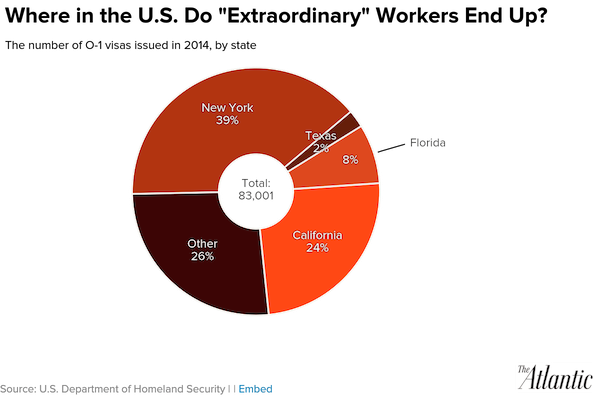How do you prove to the American government that you are extraordinary?
The easiest way is to win a Nobel or Pulitzer Prize, but that’s not a requirement. In fact, every year, the U.S. government issues thousands of work permits to foreigners it considers to have “extraordinary abilities” in the sciences, education, the arts, business, or sports. The number of times people have entered the U.S. annually with this type of work permit, called the O-1 visa, nearly tripled in the past decade, with 83,000 entries in 2014.*
Many of these workers are renowned scientists and entrepreneurs. But the subcategory for artists—which is more flexible than other O-1 designations—has made it one of the most popular ways for foreign actors to break into Hollywood, or for dancers to perform on New York City stages. (This explains why 63 percent of O-1 visa holders end up in California or New York). Orlando Ortega, a London-based attorney who helps people apply for business visas to the United States, says his firm gets inundated with calls from British actors aspiring to make it in Hollywood. “It happens every day, all the time,” he says. Ortega’s firm recently obtained about 30 of these work permits for Latin American and Spanish actors who are filming Ingobernable, a Spanish-language series for Netflix featuring Kate del Castillo, a Mexican soap-opera and film star.
Though the O-1 visa’s criteria have been described as vague and subjective, Ortega has processed enough of them to get an idea of who the United States considers to be extraordinary. Most of the time, Ortega says, the actors haven’t reached a high enough level of distinction in their native countries. He goes through a checklist that goes something like this: Do they have a job lined up? Have they won any national awards? Have they ever played a leading role in a movie? Have they ever been written up in the media? “And we keep going down the list,” says Ortega. “Nine out of 10 times, they’re not going to qualify.” Though applicants don’t need to meet all these criteria, it does boost their chance of approval. “There have been some surprises, when we were certain someone would get approved, and they didn’t, or we thought someone might not get approved, and they did,” he says.
Programs that allow employers to hire foreign workers tend to stir up resentment, and the O-1 visa is no exception. The Hollywood Reporter published a critical article earlier this year about the program, claiming that it allows the U.S. government to give a “fast-pass” to famous foreigners, such as Justin Bieber and Hugh Jackman, while less-renowned workers with more mundane jobs sometimes have to wait months or years to come to the United States.
A 27-year-old Dutch actress living in Hollywood, who asked to remain anonymous because she is renewing her O-1 visa, told me she was frustrated with her acting career in Holland. She has had several leading roles in Dutch movies and television series, but says Holland is no place for ambitious people. “It’s more theater-focused, and I love movies,” she says. “I couldn’t find more than one audition per month. Here you can go audition any given day of the week.”
The actress says it wasn’t hard to prove she qualified as extraordinary in her field, since Holland’s acting scene is pretty small. She got a lawyer, collected all the media clips about her movies, and asked acting unions in Holland and the United States to endorse her. The hardest part was finding an agent to sponsor her and agree that she was employable in her field. She got her visa in 2013, and has been stringing together work in Hollywood ever since. It’s tough, she says, though she has landed a few small television parts and one small movie role. “It’s a lot of hard work and it’s not glamorous at all, but I love this life,” she said on the phone, before boarding a plane to Amsterdam to visit her family. She plans to be back soon, and hopes her visa will be extended.

Comments
Post a Comment
Please tell me about your situation with the USCIS and any business related immigration problems or success stories.